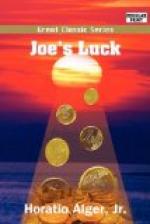“There’s nothing like a full stomach, Joshua. I wonder to whom we are indebted for this repast?”
Joe was not long in having his query answered. An exclamation, as of one startled, called the attention of the two friends to the doorway, where, with a terrified face, stood a Chinaman, his broad face indicating alarm.
“It’s a heathen Chinee, by gosh!” exclaimed Joshua.
Even at that time Chinese immigrants had begun to arrive in San Francisco, and the sight was not wholly new either to Joshua or Joe.
“Good morning, John,” said our young hero pleasantly.
“Good morning, heathen,” said Mr. Bickford. “We thought we’d come round and make you a mornin’ call. Is your family well?”
The Chinaman was reassured by the friendly tone of his visitors, and ventured to step in. He at once saw that the food which he had prepared for himself had disappeared.
“Melican man eat John’s dinner,” he remarked in a tone of disappointment.
“So we have, John,” said Mr. Bickford. “The fact is, we were hungry—hadn’t had any breakfast.”
“Suppose Melican man eat—he pay,” said the Chinaman.
“That’s all right,” said Joe; “we are willing to pay. How much do you want?”
The Chinaman named his price, which was not unreasonable, and it was cheerfully paid.
“Have you got some more bread and rice, John?” asked Mr. Bickford. “We’d like to buy some and take it along.”
They succeeded in purchasing a small supply—enough with economy to last a day or two. This was felt as a decided relief. In two days they might fall in with another party of miners or come across a settlement.
They ascertained on inquiry that the Chinaman and another of his nationality had come out like themselves to search for gold. They had a claim at a short distance from which they had obtained a small supply of gold. The cabin they had found in its present condition. It had been erected and deserted the previous year by a party of white miners, who were not so easily satisfied as the two Chinamen.
“Well,” said Joshua, after they had started on their way, “that’s the first time I ever dined at a Chinee hotel.”
“We were lucky in coming across it,” said Joe.
“The poor fellow looked frightened when he saw us gobblin’ up his provisions,” said Mr. Bickford, laughing at the recollection.
“But we left him pretty well satisfied. We didn’t treat him as the gentleman from Pike treated us.”
“No—I wouldn’t be so mean as that darned skunk. It makes me mad whenever I look at this consumptive boss he’s left behind.”
“You didn’t make much out of that horse trade, Mr. Bickford.”
“I didn’t, but I’ll get even with him some time if we ever meet again.”
“Do you know where he was bound?”
“No—he didn’t say.”
“I dare say it’ll all come right in the end. At any rate, we shan’t starve for the next forty-eight hours.”




